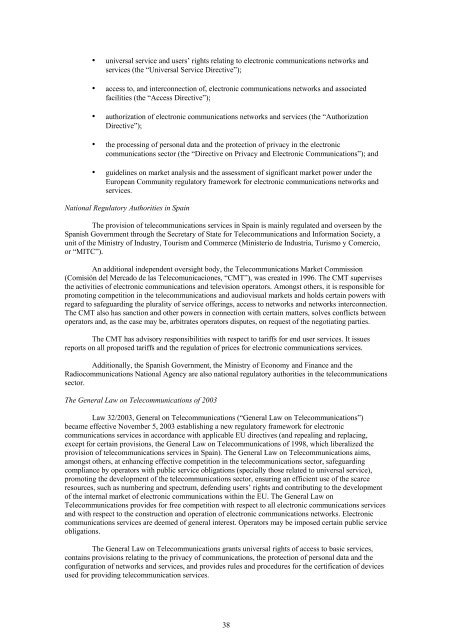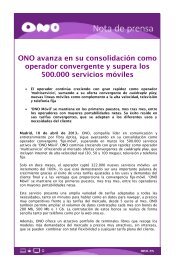Annual report (20-F) - Ono
Annual report (20-F) - Ono
Annual report (20-F) - Ono
Create successful ePaper yourself
Turn your PDF publications into a flip-book with our unique Google optimized e-Paper software.
• universal service and users’ rights relating to electronic communications networks and<br />
services (the “Universal Service Directive”);<br />
• access to, and interconnection of, electronic communications networks and associated<br />
facilities (the “Access Directive”);<br />
• authorization of electronic communications networks and services (the “Authorization<br />
Directive”);<br />
• the processing of personal data and the protection of privacy in the electronic<br />
communications sector (the “Directive on Privacy and Electronic Communications”); and<br />
• guidelines on market analysis and the assessment of significant market power under the<br />
European Community regulatory framework for electronic communications networks and<br />
services.<br />
National Regulatory Authorities in Spain<br />
The provision of telecommunications services in Spain is mainly regulated and overseen by the<br />
Spanish Government through the Secretary of State for Telecommunications and Information Society, a<br />
unit of the Ministry of Industry, Tourism and Commerce (Ministerio de Industria, Turismo y Comercio,<br />
or “MITC”).<br />
An additional independent oversight body, the Telecommunications Market Commission<br />
(Comisión del Mercado de las Telecomunicaciones, “CMT”), was created in 1996. The CMT supervises<br />
the activities of electronic communications and television operators. Amongst others, it is responsible for<br />
promoting competition in the telecommunications and audiovisual markets and holds certain powers with<br />
regard to safeguarding the plurality of service offerings, access to networks and networks interconnection.<br />
The CMT also has sanction and other powers in connection with certain matters, solves conflicts between<br />
operators and, as the case may be, arbitrates operators disputes, on request of the negotiating parties.<br />
The CMT has advisory responsibilities with respect to tariffs for end user services. It issues<br />
<strong>report</strong>s on all proposed tariffs and the regulation of prices for electronic communications services.<br />
Additionally, the Spanish Government, the Ministry of Economy and Finance and the<br />
Radiocommunications National Agency are also national regulatory authorities in the telecommunications<br />
sector.<br />
The General Law on Telecommunications of <strong>20</strong>03<br />
Law 32/<strong>20</strong>03, General on Telecommunications (“General Law on Telecommunications”)<br />
became effective November 5, <strong>20</strong>03 establishing a new regulatory framework for electronic<br />
communications services in accordance with applicable EU directives (and repealing and replacing,<br />
except for certain provisions, the General Law on Telecommunications of 1998, which liberalized the<br />
provision of telecommunications services in Spain). The General Law on Telecommunications aims,<br />
amongst others, at enhancing effective competition in the telecommunications sector, safeguarding<br />
compliance by operators with public service obligations (specially those related to universal service),<br />
promoting the development of the telecommunications sector, ensuring an efficient use of the scarce<br />
resources, such as numbering and spectrum, defending users’ rights and contributing to the development<br />
of the internal market of electronic communications within the EU. The General Law on<br />
Telecommunications provides for free competition with respect to all electronic communications services<br />
and with respect to the construction and operation of electronic communications networks. Electronic<br />
communications services are deemed of general interest. Operators may be imposed certain public service<br />
obligations.<br />
The General Law on Telecommunications grants universal rights of access to basic services,<br />
contains provisions relating to the privacy of communications, the protection of personal data and the<br />
configuration of networks and services, and provides rules and procedures for the certification of devices<br />
used for providing telecommunication services.<br />
38
















